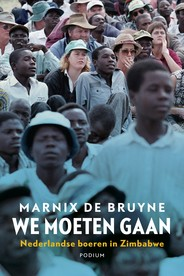Seminar: Why hundreds of Dutch emigrants chose Rhodesia-Zimbabwe as their new home
Primary tabs
 A journalistic journey through history and through the current Zimbabwe.
A journalistic journey through history and through the current Zimbabwe.
Why did so many people emigrate from the Netherlands in the fifties? Why did hundreds of them choose to settle in what was then called Rhodesia, today’s Zimbabwe? And why did so many of them stay after 1965, when the country was led by a white-minority regime, faced an international boycott and was engulfed in a bloody guerrilla war?
Journalist Marnix de Bruyne will address these questions in the seminar loosely connected to his book ‘We moeten gaan. Nederlandse boeren in Zimbabwe’. He will share the story of a Dutch widow, who ignored advice to return to the Netherlands after her husband was killed by a landmine, planted in the road by the guerrilla’s with the help of two of her workers. She avoided being chased from her farm after 2000, when Robert Mugabe’s regime started the nationalization of white-owned farms, but ultimately lost her farm in 2014.
Marnix de Bruyne will also tell you about another Dutch tobacco farmer, who was shot through the nose in 2012 by so-called war veterans, who wanted to chase him from his farm. Remarkably, he decided to work together with the person who probably gave the order for the attempted killing. Today, he manages the farm that he once owned, as a business partner of this new owner.
Finally, he will tell you about the hopes of and prospects for new black farmers on land formerly owned by Dutch immigrants or other white farmers. Marnix will show how the tobacco sector has recovered, as one of the few industries in the country, in spite of the disastrous and persistent economic circumstances that have provoked ongoing protests against the Mugabe government.
You can purchase Marnix de Bruyne's book We moeten gaan. Nederlandse boeren in Zimbabwe at the seminar (reduced price: € 22,50).
Speaker
 Marnix de Bruyne (1965) was correspondent in South Africa for amongst others Het Parool and Business Nieuws Radio (BNR). From 2007-2011 he worked at the foreign desk of de Volkskrant, writing about Africa. In 2010 he published Het land van Soekmekaar, about how a rural village experiences the growing pains of the new South Africa. Currently he is contributing editor at Wordt Vervolgd, a monthly magazine about human rights, published by Amnesty International.
Marnix de Bruyne (1965) was correspondent in South Africa for amongst others Het Parool and Business Nieuws Radio (BNR). From 2007-2011 he worked at the foreign desk of de Volkskrant, writing about Africa. In 2010 he published Het land van Soekmekaar, about how a rural village experiences the growing pains of the new South Africa. Currently he is contributing editor at Wordt Vervolgd, a monthly magazine about human rights, published by Amnesty International.

